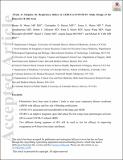STudy of Alteplase for Respiratory failure in SARS‐Cov2/COVID‐19: Study Design of the Phase IIa STARS Trial
Author(s)
Moore, Hunter B.; Barrett, Christopher D; Moore, Ernest E.; Jhunjhnuwala, Rashi; McIntyre, Robert C.; Moore, Peter K; Wang, Janice; Hajizadeh, Negin; Talmor, Daniel S.; Sauaia, Angela; Yaffe, Michael B; ... Show more Show less
Downloadrth2.12395.pdf (14.10Mb)
Publisher with Creative Commons License
Publisher with Creative Commons License
Creative Commons Attribution
Terms of use
Metadata
Show full item recordAbstract
Background
The COVID‐19 pandemic has caused a large surge of acute respiratory distress syndrome (ARDS). Prior phase I trials (non COVID‐19) demonstrated improvement in pulmonary function in ARDS patients using fibrinolytic therapy. A follow‐up trial using the widely available tissue‐plasminogen activator (alteplase) is now needed to assess optimal dosing and safety in this critically ill patient population.
Objective
To describe the design and rationale of a Phase IIa trial to evaluate the safety and efficacy of alteplase treatment for moderate/severe COVID‐19‐induced ARDS.
Patients/Methods
A rapidly adaptive, pragmatic, open label, randomized, controlled, phase IIa clinical trial will be conducted with three groups: intravenous(IV) alteplase 50mg, IV alteplase 100mg, and control (standard‐of‐care). Inclusion criteria are known/suspected COVID‐19 infection with PaO2/FiO2 ratio<150mmHg for >4 hours despite maximal mechanical ventilation management. Alteplase will be delivered through an initial bolus of 50mg or 100mg followed by heparin infusion for systemic anticoagulation, with alteplase re‐dosing if there is a >20% PaO2/FiO2 improvement not sustained by 24 hours.
Results
The primary outcome is improvement in PaO2/FiO2 at 48 hours post‐randomization. Other outcomes include: ventilator‐ and ICU‐free‐days, successful extubation (no reintubation ≤3 days after initial extubation), and mortality. Fifity eligible patients will be enrolled in a rapidly adaptive, modified stepped‐wedge design with four looks at the data.
Conclusion
Findings will provide timely information on the safety, efficacy and optimal dosing of tPA to treat moderate/severe COVID‐19‐induced ARDS, which can be rapidly adapted to a phase III trial.
Description
Forthcoming article in: Research and Practice in Thrombosis and Haemostatis.
Date issued
2020-05Department
Koch Institute for Integrative Cancer Research at MIT; Center for Precision Cancer Medicine; Massachusetts Institute of Technology. Department of Biological Engineering; Massachusetts Institute of Technology. Department of BiologyJournal
Research and Practice in Thrombosis and Haemostatis
Publisher
Wiley
Citation
Moore, Hunter B. et al. "STudy of Alteplase for Respiratory failure in SARS‐Cov2/COVID‐19: Study Design of the Phase IIa STARS Trial." Forthcoming in: Research and Practice in Thrombosis and Haemostatis
Version: Author's final manuscript
ISSN
2475-0379
2475-0379